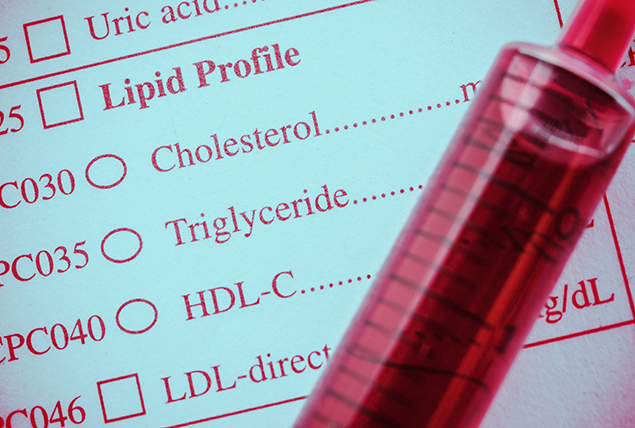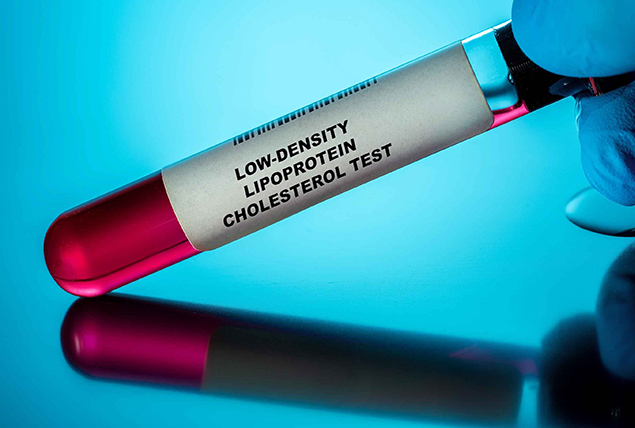Why Does High Cholesterol Matter So Much?

Key Points
- If your total cholesterol is 240 mg/dl or more, you may need a combination of lifestyle changes and medications to get your cholesterol to a less-risky range.
- Alcohol and cigarette use can increase the likelihood of higher cholesterol and a bad ratio of HDL to LDL levels.
- Only about half of the U.S. adults who could benefit from medication to lower cholesterol are taking them.
Cholesterol gets a bad rap for its association with heart disease, heart attack and stroke risk. But cholesterol itself isn't a problem. It's essential for life and function.
What is cholesterol?
"Cholesterol is a type of fatty substance found in your body's cells. It plays an important role in helping the body produce cell membranes, hormones and vitamin D," said Rupal Bhingradia, M.D., FAAFP and a board member of the American Academy of Family Physicians (AAFP).
Interestingly enough, cholesterol levels aren't something you can completely control on your own. Cholesterol is manufactured in your body, and while there are lifestyle elements that can help keep levels in an ideal range, genetics play an important role, too.
"We make cholesterol in our liver," said Teresa Lovins, M.D., FAAFP and AAFP board member.
"Our liver makes what we call 'blood cholesterol' and it makes all we need. We also get some cholesterol from the foods we eat from animal sources. This is referred to as 'dietary cholesterol,'" Lovins said.
Understanding cholesterol readings
The next time you get a blood test to determine your cholesterol levels, this is what you need to know about the results — and what you can or can't do to improve your overall cholesterol.
A standard cholesterol reading is typically broken down into four separate segments:
- Total cholesterol
- High-density lipoproteins (HDL cholesterol)
- Low-density lipoproteins (LDL cholesterol)
- Triglycerides
While total cholesterol is typically used to determine whether you're at a higher risk for heart disease, your actual risk may differ—higher or lower—depending on the ratio of HDL and LDL cholesterol in your blood.
"Someone would be considered to have high cholesterol when their total cholesterol is higher than 240 mg/dl, borderline when it's between 200 mg/dl and 239 mg/dl, and healthy when it's lower than 200 mg/dl," says Bhingradia.
However, it's important to note that HDL cholesterol is considered "good" cholesterol while LDL cholesterol is considered "bad" cholesterol due to its effect on heart disease risk.
"HDL is considered 'good' because it helps remove excess cholesterol from your body while LDL is considered 'bad' because it can build up in your arteries and lead to heart disease," Bhingradia said.
You both need and produce both types of cholesterol but the problems begin when HDL cholesterol falls below ideal ranges and/or LDL cholesterol rises above ideal ranges, thus affecting the ratio of HDL to LDL cholesterols within your blood.
"The goal is to have HDL levels above 60 mg/dl for most people, and higher is better. The more concerning cholesterol in the blood is LDL which should be less than 130 mg/dl. The lower the better for this one," Lovins said. "If the HDL is very low, it can be a risk factor for other health problems."
To summarize, the following is the best outcome when your doctor tests your blood:
- Total cholesterol: Less than 200 mg/dl
- HDL cholesterol: More than 60 mg/dl
- LDL cholesterol: Less than 130 mg/dl
If your total cholesterol is between 200-239 mg/dl—a borderline reading—your doctor will most likely want to talk to you about ways to manage your risk and see if you can lower your cholesterol through lifestyle changes.
If your total cholesterol is 240 mg/dl or more—a high reading—your healthcare provider may well suggest a combination of lifestyle changes and medications to get your cholesterol to a less-risky range.
Triglycerides are also a part of most cholesterol readings. This is another type of fat found in your blood that's typically impacted by what you eat. Ideally, your triglyceride levels should be below 150 mg/dl. If higher, your doctor will likely suggest lifestyle changes to bring your number down.
Recommended
- The Facts About High Cholesterol: Find out how high cholesterol affects your sexual health.
- A High Cholesterol Level Often Goes Undetected: No set cholesterol level requires medication. Diagnosis and treatment are individual.
- I Had a Mild Heart Attack. Can I Safely Have Sex Again?: An intercourse-induced infarction is rare, but other factors affect post–heart attack intimacy.
How genetics and lifestyle play a role in your cholesterol numbers
Genetics plays a significant role in your cholesterol levels. You may feel guilty or like you've somehow "messed up" if your cholesterol readings come back high. However, particularly for those with very high cholesterol, it may be more an issue of genetics than lifestyle.
That said, lifestyle does play a role, so treatment plans may use one, or both, tools to help keep cholesterol in check.
"The risk of high cholesterol is often related to genetics. When your parents have high cholesterol, you're at an increased risk of also having high cholesterol" Lovin said. "But high cholesterol can also occur when you eat poorly, including fatty meat and dairy products, as well as processed foods made with saturated fats, like potato chips. If you exercise and eat right, you can reduce your risk of developing high cholesterol."
And therein lies an important reality. You can control your cholesterol levels to a point, and you should certainly do your best to make healthy decisions to reduce your risk of chronic diseases like heart disease. That said, if you're eating healthy and exercising regularly, and despite the consistent effort you haven't seen your readings drop to a level that you or your doctor feel comfortable with, there's no shame in using medications to help control cholesterol.
How cigarettes, alcohol, and other diseases can negatively impact cholesterol levels
Beyond diet, exercise, and genetics, there are a few other factors that may affect your risk of developing high cholesterol. Bhingradia specifically points to alcohol and cigarette use, which increases the likelihood of higher cholesterol and a bad ratio of HDL to LDL levels.
Also, because cholesterol is manufactured in the liver and is related to hormone production, individuals with alcoholism—which can damage the liver, other liver diseases, or hormone-related diseases such as thyroid disease, may be at a greater risk of developing high cholesterol.
If you have type 2 diabetes, you may also be at risk of developing high cholesterol. Type 2 diabetes can lower HDL levels and raise LDL levels, ultimately increasing the risk for heart disease and stroke.
What to know about socioeconomics, culture, and cholesterol
There is also a clear link between socioeconomic status and heart disease risk factors, including high cholesterol. Studying the CDC's disease maps, it's clear that heart disease is more prevalent in areas with lower income status.
Some of this is likely due to genetic factors, and some may be cultural, as some cultures may tend to consume more fatty foods. However, a large piece comes down to inequalities in nutritious foods and health-related resources.
"Those with lower incomes may experience food deserts, making nutritious foods harder to access, instead relying on highly processed foods with high-fat content, leading to higher cholesterol," Bhingradia said.
"Socioeconomic status can also influence the availability of free time to exercise or the income needed to afford gym memberships," he said.
Most importantly, socioeconomics influences the ability to access healthcare. Those with lower incomes may not have insurance, or have insurance with a high deductible or copay.
"They also may not be able to afford to take time off work to see a doctor," he added. "Ultimately, this may lead to individuals being unaware of their cholesterol levels or how to address them."
The cholesterol-related stats you need to know
High cholesterol levels are incredibly common, but this is a heart disease risk factor that can be managed through lifestyle and medications.
Knowledge is power. Having your cholesterol checked regularly is important so you can act early, and act consistently in self-care and management. Here are a few cholesterol-related facts from the CDC that shouldn't be ignored:
- High cholesterol has no symptoms—without getting your cholesterol checked with a simple blood test, you won't know you have high cholesterol.
- Roughly 12 percent of all U.S. adults over the age of 20 have high total cholesterol levels (above 240 mg/dL).
- About 17 percent of all U.S. adults over the age of 20 have low HDL cholesterol levels (below 40 mg/dL).
- Only about half of the U.S. adults who could benefit from cholesterol meds are taking them.
- About 7 percent of U.S. children between the ages of 6-19 have high total cholesterol (above 240 mg/dL).
- High blood cholesterol increases the risk of heart disease and stroke
"Diet and lifestyle are ways to combat high cholesterol, as studies show physical exercise lowers LDL and increases HDL—the cardio-protective cholesterol," said Rathna Nuti, M.D., board-certified, and a family medicine and sports medicine doctor based in Dallas.
The bottom line
Take control of your health and health-related risk factors. Even if your cholesterol levels are related to genetics, making changes to your lifestyle can reduce your risk of a serious or fatal disease.
If you haven't had your cholesterol tested in a while, go ahead and schedule an appointment with your local healthcare provider and start making plans to take charge of your exercise and nutrition.


















